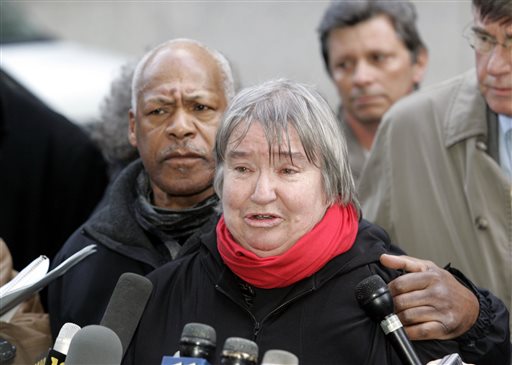Ex-terror trial lawyer freed on NY judge’s order

In this Feb. 10, 2005 file photo, attorney Lynne Stewart cries as she speaks to the press with her husband Ralph Pointer next to her, left, outside Federal Court in New York. Stewart, a former civil rights lawyer convicted in a terrorism case and sentenced to 10 years in prison is entitled to compassionate release because she has less than 18 months to live, prosecutors and the Federal Bureau of Prisons told a judge on Tuesday, Dec. 31, 2013. (AP Photo/David Karp, File)
NEW YORK—A dying former civil rights lawyer convicted in a terrorism case and sentenced to 10 years was released from prison on Tuesday after prosecutors and the Federal Bureau of Prisons made the recommendation to a judge.
“It’s just really wonderful,” 74-year-old Lynne Stewart said in a telephone interview after being freed from the Federal Medical Center Carswell in Fort Worth, Texas. “I’m very grateful to be free. We’ve been waiting months and months and months.”
U.S. District Judge John G. Koeltl signed the release order after government lawyers filed a letter in Manhattan federal court earlier Tuesday saying Stewart qualified for early release because she’s suffering from breast cancer that has metastasized to her lungs and bones and has less than 18 months to live.
“The director of the Bureau of Prisons contends, and this court agrees, that the defendant’s terminal medical condition and very limited life expectancy constitute extraordinary and compelling reasons that warrant the requested reduction,” the judge wrote.
He said Stewart, who had been undergoing treatment at the Fort Worth medical center, would be released when travel arrangements could be made.
Article continues after this advertisementStewart left hours later with her husband, Ralph Poynter. They were headed home to New York.
Article continues after this advertisement“It’s a great way to start the new year,” Poynter said.
Stewart was convicted of helping a blind Egyptian sheik communicate with followers while he was serving a life sentence in a plot to blow up five New York landmarks and assassinate then-Egyptian President Hosni Mubarak. She has been imprisoned since 2009 and wasn’t scheduled for release until August 2018.
She was first diagnosed with breast cancer in November 2005. The cancer went into remission but was discovered to have recurred after she was imprisoned. Supporters had rallied to get her released.
“Despite aggressive treatment, doctors have advised that her prognosis is poor,” the prosecutors’ letter said, adding she also has been diagnosed with anemia, high blood pressure, asthma and Type 2 diabetes.
Stewart also had written to the judge, saying she didn’t want to die in “a strange and loveless place” and wanted to go home.
A previous compassionate-release request was denied in part on the grounds that Stewart had more than 18 months to live, though the judge said he would act promptly if the Federal Bureau of Prisons agreed she had less than 18 months to live and granted a compassionate-release application.
A federal appeals court in 2012 upheld Stewart’s 10-year sentence, saying she earned it through serious crimes that she refused to acknowledge. The 2nd U.S. Circuit Court of Appeals said it was fair to boost Stewart’s sentence from the two years and four months she was given in 2006.
The three-judge panel that had ordered Stewart to be resentenced said it disagreed with her claim that her sentence was “shockingly high.” It accused her of exhibiting a “stark inability to understand the seriousness of her crimes.”